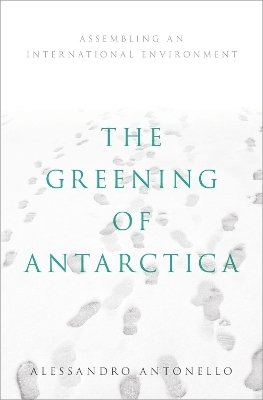
The Greening of Antarctica
Assembling an International Environment
Seiten
2019
Oxford University Press Inc (Verlag)
978-0-19-090717-4 (ISBN)
Oxford University Press Inc (Verlag)
978-0-19-090717-4 (ISBN)
The Greening of Antarctica reveals how the geopolitical, intellectual, conceptual, and legal foundations of contemporary Antarctic environmental protection and imagination were formed in the crucial period between the signing of the Antarctic Treaty in 1959 and the signing of the Convention on the Conservation of Antarctic Marine Living Resources in 1980.
In The Greening of Antarctica Alessandro Antonello investigates the development of an international regime of environmental protection and management between the signing of the Antarctic Treaty in 1959 and the signing of the Convention on the Conservation of Antarctic Marine Living Resources in 1980. In those two decades, the Antarctic Treaty parties and an international community of scientists reimagined what many considered a cold, sterile, and abiotic wilderness as a fragile and extensive regional ecosystem. Antonello investigates this change by analyzing the negotiations and developments surrounding four environmental agreements: the Agreed Measures for the Conservation of Antarctic Fauna and Flora in 1964; the Convention for the Conservation of Antarctic Seals in 1972; a voluntary restraint resolution on Antarctic mining in 1977; and the Convention on the Conservation of Antarctic Marine Living Resources in 1980.
Though distant from world populations, Antarctica has long been a site of inter-state contest for geopolitical power and standing. This book reveals how a range of contests, geopolitical, epistemic and imaginative, created the environmental protection regime of the Antarctic Treaty System, and discusses the tension between states' individual searches for power and the collective desire for stability in the region. In this international and diplomatic context, the actors were not only trying to keep relations between themselves orderly, but they were also using treaties to order the human relationship with the environment.
Drawing on a wide range of international archives, many newly-opened, The Greening of Antarctica offers the first detailed narrative of a crucial period in Antarctic history and reveals the contours of global environmental thought and diplomacy in the transformative Age of Ecology.
In The Greening of Antarctica Alessandro Antonello investigates the development of an international regime of environmental protection and management between the signing of the Antarctic Treaty in 1959 and the signing of the Convention on the Conservation of Antarctic Marine Living Resources in 1980. In those two decades, the Antarctic Treaty parties and an international community of scientists reimagined what many considered a cold, sterile, and abiotic wilderness as a fragile and extensive regional ecosystem. Antonello investigates this change by analyzing the negotiations and developments surrounding four environmental agreements: the Agreed Measures for the Conservation of Antarctic Fauna and Flora in 1964; the Convention for the Conservation of Antarctic Seals in 1972; a voluntary restraint resolution on Antarctic mining in 1977; and the Convention on the Conservation of Antarctic Marine Living Resources in 1980.
Though distant from world populations, Antarctica has long been a site of inter-state contest for geopolitical power and standing. This book reveals how a range of contests, geopolitical, epistemic and imaginative, created the environmental protection regime of the Antarctic Treaty System, and discusses the tension between states' individual searches for power and the collective desire for stability in the region. In this international and diplomatic context, the actors were not only trying to keep relations between themselves orderly, but they were also using treaties to order the human relationship with the environment.
Drawing on a wide range of international archives, many newly-opened, The Greening of Antarctica offers the first detailed narrative of a crucial period in Antarctic history and reveals the contours of global environmental thought and diplomacy in the transformative Age of Ecology.
Alessandro Antonello is McKenzie Postdoctoral Fellow in the School of Historical and Philosophical Studies, the University of Melbourne.
Introduction
1 Principles for "unprincipled men": filling the household of Antarctic nature
2 Arguing with seals: the changing terrain of authority
3 Mining the deep south: exploitation, environmental impact, and contested futures
4 Seeing the Southern Ocean ecosystem: enlarging the Antarctic community
5 The plenitude of nature and sovereignty: boundaries of insiders and outsiders
Epilogue
Bibliography
| Erscheinungsdatum | 21.05.2019 |
|---|---|
| Verlagsort | New York |
| Sprache | englisch |
| Maße | 239 x 157 mm |
| Gewicht | 499 g |
| Themenwelt | Geisteswissenschaften ► Archäologie |
| Geschichte ► Allgemeine Geschichte ► Zeitgeschichte | |
| Geisteswissenschaften ► Geschichte ► Regional- / Ländergeschichte | |
| Naturwissenschaften ► Biologie ► Ökologie / Naturschutz | |
| ISBN-10 | 0-19-090717-7 / 0190907177 |
| ISBN-13 | 978-0-19-090717-4 / 9780190907174 |
| Zustand | Neuware |
| Haben Sie eine Frage zum Produkt? |
Mehr entdecken
aus dem Bereich
aus dem Bereich
Gewalt, Umwelt, Identität, Methode
Buch | Softcover (2024)
Spector Books OHG (Verlag)
CHF 49,95
wie Freud im Kollektiv verschwand
Buch | Hardcover (2024)
Klett-Cotta (Verlag)
CHF 34,95


